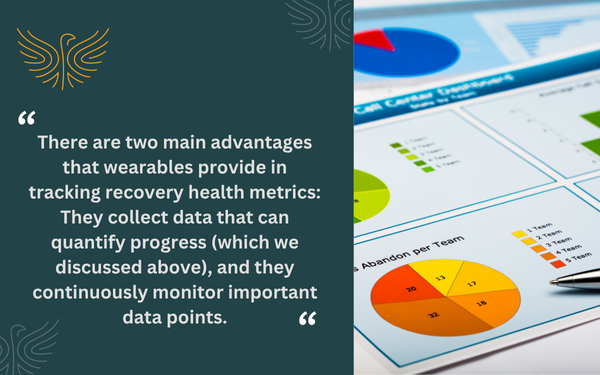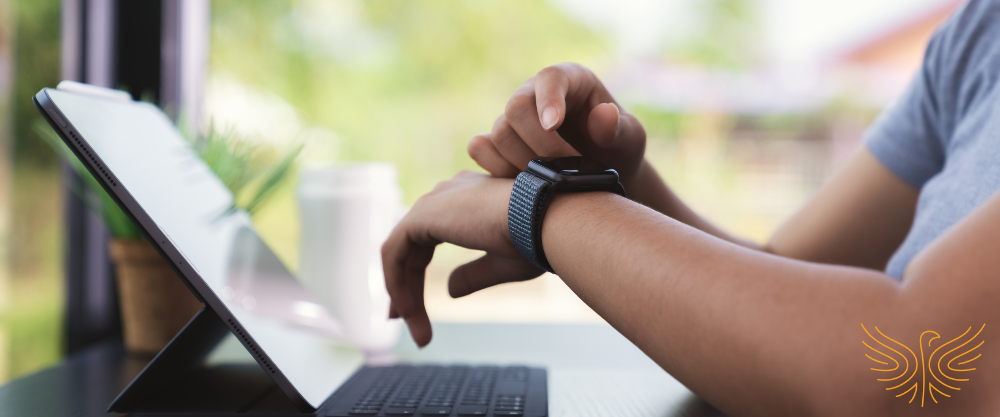Modern technology has transformed many aspects of daily life. Everything from smartphones to wearable devices allows us to easily stay connected to loved ones, keep up-to-date with breaking news and even track personalized metrics to keep us healthy.
Wearables can even play an important role in addiction recovery, with many features collecting data in real-time that can inform us about our current physical and mental state.
Below, we’ll discuss the traditional challenges of tracking recovery progress, as well as how wearables can help.
Tracking Your Recovery Progress
One of the biggest challenges of tracking your recovery progress is that there’s so many different factors involved. Substance abuse often affects a person’s physical activity, mental health and their emotions.
All of these areas need to be addressed in big-picture recovery, and it can be difficult to objectively monitor each. For instance, while self-reporting and formal therapy have certainly proved effective for recovery, neither provides real-time stats to quantify progress.
What wearables can do is collect this data, which can then be used to track different patterns in overall well-being to inform both the person who is recovering as well as their support system, such as healthcare providers.
Advantages of Wearables
There are two main advantages that wearables provide in tracking recovery health metrics: They collect data that can quantify progress (which we discussed above), and they continuously monitor important data points.

This latter aspect is crucial in successful recovery. Formal therapy programs, recovery support groups and peer assistance are all proven ways to achieve and maintain sobriety.
However, the key to long-lasting, sustainable recovery is self-monitoring. Those who are able to maintain their sobriety are good at continuously monitoring their physical, mental and emotional health.
What wearables do is put the power of doing this in people’s hands — or on their wrists. If stress levels or heart rates rise, for instance, it could be an early indicator that they need to seek help.
By responding quickly to these warning signs, it can improve one’s chances of maintaining recovery over the long term.
How to Track Recovery Progress with Wearables
There are many options when it comes to wearable technology. The simplest form are fitness trackers, which focus on general health metrics and physical activity. Smartwatches take that a step further, offering tools for tracking your sleep, heart rate, oxygen levels and body temperature, among other things.
The smartwatches on the market can provide valuable information to you, and can also keep you connected to a sober community. Of course, these are often more expensive than simple fitness trackers, so it’s something to consider as you make your choice as to the type of wearable you want.
Features such as the ability to monitor your heart rate can give you indicators when you are experiencing changes in your emotions and/or stress. Tracking your sleep patterns can show you if you’re struggling with your mental health.
If you’re worried about relapsing, some wearables have sensors in them that can alert healthcare providers or other people if you use alcohol so they can intervene as soon as possible.
Perhaps the best part about wearables is that, like other modern technology, it’s not a one-size-fits-all solution. You can tailor the experience to your specific preferences and needs in your recovery journey.
You get to decide which metrics you want to track, which apps you want to connect, and what alerts and feedback you receive. You can even decide if you want to share the data your wearable collects with members of your support team — be it your therapist, your personal network and/or your healthcare providers.
Perhaps the biggest advantage that wearables provide is the ability to simplify the tracking and monitoring of your recovery health metrics. Sober apps, for example, collect the data from your wearable and produce easy-to-understand charts and metrics so you can see how you’re doing in your recovery journey in real-time.
Consider Wearables to Enhance Your Recovery Journey
Recovery is a lifelong journey, and it takes a lot of work on your part to continually monitor your physical, mental and emotional health. Modern wearable technology can make this easier for you to track on a consistent basis.
All you have to do is put the smartwatch or fitness tracker on your wrist, and it will run “in the background” as you go about your daily life. It will collect essential data and provide you with real-time insights as to how you’re doing in your recovery journey.
Along the way, the team at Freedom Recovery Centers is always here to help. We can be the support you need when you need it, providing you with hands-on care to ensure you live a healthy life.
For more information, give us a call at 804-635-3746 or fill out our online form.
.svg)






.svg)

.svg)



.svg)
